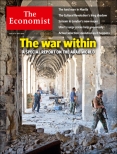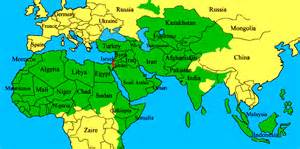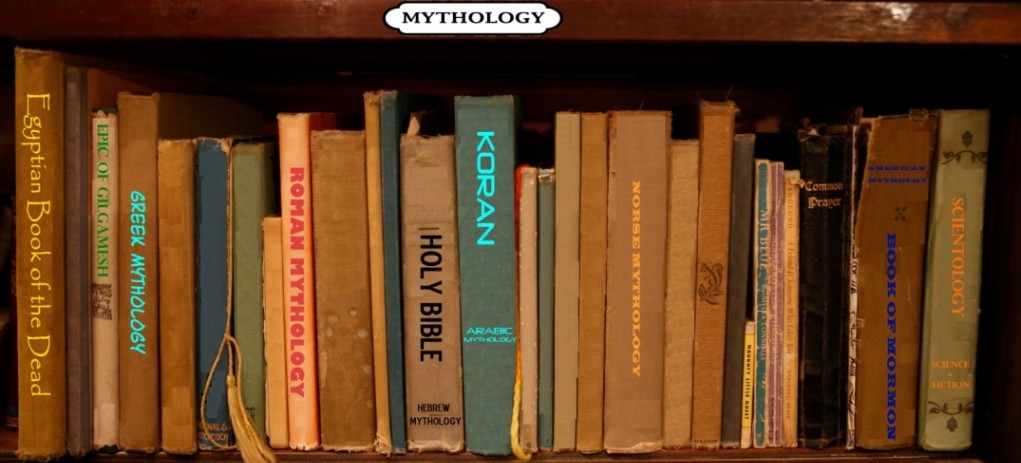
The May 14-20th edition of the Economist has a special report on the Arab world entitled The War Within. It is an excellent and detailed overview of the unstable and repressive upheavals within and between the Middle East Arab nations. The byline of the summary on page 7, previewing the extended articles in the report reads:
“Europe and America made mistakes, but the misery of the Arab world is caused mainly by its own failures.”
As usual, the Economist writers do a comprehensive and thorough job of covering the historical, political, economic, and cultural aspects of their target article’s topic. Their reporting always makes for a great read, a good cliff notes education and analysis.
Their upshot:
“All of this is not so much a clash of civilizations as a war within Arab civilization. Outsiders cannot fix it-though their actions could help make things bit better, or a lot worse. First and foremost, a settlement must come from Arabs themselves.”
Continuing with the summary page, the Economist warns of 4 “easy answers” for assigning blame to the current turmoil raging across the entire Arab world from Morrocco to Iran. (And, one might add, across Southern Asia to include the non-Arab Muslim nations of Afghanistan, Pakistan, Bangladesh, Indonesia and Malaysia as well, though this report is focused solely on the Arabic countries of Africa and the Middle East. The political upheavals, human rights denials, economic failures and Islamist terrorist atrocities are widespread across all Muslim nations; not at all confined to the Arabian Middle East. – WAZ).

The 4 easy answers to the turmoil they suggest to avoid are:
1. “First, many blame the mayhem on Western powers…” They correctly note that many countries worldwide have suffered through “traumatic histories” and “blossomed” despite colonial nation building and meddling. There is much more to the Arab problem than past colonial intervention or rule. This simplistic view adopted by many of the regressive left is plainly that; too simple and lacking in explanatory power for the progress of most of the once-colonized nations all around the globe and the repeated failures of Arabic (and non-Arabic) Islamic states.
2. “A second wrong-headed notion is that redrawing the borders of Arab countries will create more stable states that match the ethnic and religious contours of the population. Not so: there are no neat lines on a region where ethnic groups and sects can change from one village or one street to the next. “
3. “A third ill-advised idea is that Arab autocracy is the way to hold back extremism and chaos”
Assad in Syria, or el-Sisi in Egypt are not enjoying any more success than previous despots like Saddam Hussein, the Shah of Iran, or the contemporary repressive regimes of the Iranian theocracy or the Saudi monarchy in holding back Islamism, earning political legitimacy or making more than token economic progress, and human rights violations remain rampant across the Arab (Islamic) world.
4. “The fourth bad argument is that the disarray is the fault of Islam….Without Islam, no solution is likely to endure.” This is where I part company with the Economist view, not all with their data and analysis, but solely with this one conclusion regarding Islam. I’d rephrase their tag line to read:
“With Islam,(as it currently exists across the entire Muslim world) no solution has, nor is likely to endure.”
Throughout the 5 target articles and 3 sidebars comprising their in-depth 16 page report, only one of which is directly focused on the religion itself, Islam pops up in nearly every other paragraph as a contributing, if not determining factor to the continuing instability and lack of progress on all fronts. Similarly, another unrelated article in the the same issue is entitled “Islamic State in Libya” and in the very next issue (May 21-27th), 5 separate articles report on Islamic violence or human rights violations in the US, Britain, Indonesia, Turkey and the Congo. The confounding of the Muslim religion with political upheaval, lack of social progress and a stifling of human rights is repeated over and over again in the Economist’s own accounts of turmoil across Islamic states.
Here’s but a small sample of their observations drawn from the report that continually implicate the Muslim religion. If not the sole reason, Islam itself is intricately entwined in the strife and backwardness of every Arab/Muslim country. In my own view, drawn from this special report, the Economist’s weekly coverage of the Muslim world, a dozen or so books penned by scholars, journalists and historians of Islam, and from the writings and speeches of both ex-Muslims and moderate Muslims calling for reform, I conclude that Islam itself IS definitely the biggest cause of not just Arab/Middle Eastern instability and violence, but of all that we witness in Islamic countries wherever they are found.
In their own words from “The War Within” :
1. “...stands witness to the destruction of Iraq, and of much of the modern Arab order….On one side Daesh (IS-Islamic State) claims to have restored the pure law of God and the ancient Islamic caliphate, on the other the Kurds live by modern man-made democracy (of sorts) and nationalism…”
2. “A land of great monotheistic religions has brought forth many who kill in the name of God.”
3. “Sectarianism has become acute. The contest between Saudi Arabia, the self-appointed champion of the Sunnis, and Iran, the leading Shi’a power, makes everything worse” (their words, not mine).
4. “…Islam, and the Sunni variety in particular, is in tumult over the place of religion in politics and the role of jihad (holy war).”
5.“The main ideologies of the Arab world – Arabism, Islamism and now salfi-jihadism – sought to overcome the hated Sykes-Picot borders.” (Two out of three of these ideologies are religious and pervasive, only one is nationalistic-political.)
6. This paragraph states the issue most clearly:
“For those who think it is because Western civilization has proved superior, the remedy is to adopt secularism, rationalism and, above all, democracy. Yet for those who believe that Muslims have suffered because they failed to keep God’s ordinances, the only response is to return to the religious purity of the early caliphs. As Khaled al Dakhil, a Saudi commentator sums it up: ‘We have a chronic problem of governance that is more than 1,400 years old. Who is the rightful successor to the Prophet? The question is still hanging over our heads'”
7. One of the target articles under the rubric ‘Religion’ is entitled, “The New Strife.” It goes on for 3 pages detailing the particulars of the Sunni-Shi’a split and subsequent rampant hatred of the two groups: “Islam is more than ever the cause for which everyone is fighting.” (Again their words, not mine).
8. One of the main reasons for the intertwining of religion and politics in the Muslim world, also noted previously by Sam Harris as one key factor delineating Islam from other religions is directly noted in “The New Strife:” “Islam holds great political power. Muhammad was not only a religious prophet but also a temporal ruler and warrior. Islam was spread by both the word and the sword. For many Muslims Islam is not just a personal faith but also a blueprint for organizing a perfect society. The Western notion of separating religion from politics is regarded as nonsensical. “
9. Regarding the sectarian divide: “..compromise is a concession, a concession is a defeat and a defeat is death.” Political compromise is more than merely difficult when religious sects view each other as apostates and concession and compromise are considered succumbing to the infidel enemy.
10. The following paragraph excerpted from the last of the 5 target articles in the report couldn’t state the acknowledgment of the primacy of the religious sectarian roadblocks to any true political solution any more succinctly:
“Under a modern-day Sykes-Picot agreement, Iraq might be broken up into a Kurdistan in the north, Shiastan in the south and Sunnistan in the west. Syria could split into an Alawistan along the Mediterranean and a Sunnistan to the west, which might merge with the Iraqi one (as Daesh has already done). In Saudi Arabia the more liberal Hijazis on the Red Sea and the Shias in the Eastern Province might be glad to be rid of the Wahhabis from the central Nejd”
From their excellent research I conclude the opposite of their claim, that “Islam is not at fault.” In particular and in direct contrast I determine: The disarray is primarily the fault of Islam. There are plenty of other issues the report examines, but Islam is infused in all aspects of the political, economic and social dilemmas they cover. Furthermore, and equally obvious is this accompanying fact so well delineated by the Economist’s exhaustive reporting: the biggest roadblock to political and social progress, to any significant improvement of the situations in the entire Muslim world, is the religion of Islam. Many ex-Muslims speaking out today, whom I have featured here, here, and here, make the bold claim that it is easier to dump Islam altogether in order to embrace the secular ideals that make compromise and progress possible, than to reform the religion. Be that is it may, (and I am inclined to believe them) Islam as it exists, in whatever form, in whichever state, appears to be the main problem to be confronted before progress in the Arab and larger Muslim world is possible.
Hitch was right, “Religion poisons everything.” His observation is no more evident than in the struggles for modernity in every Muslim country, enclave, neighborhood, even family.
“Islam poisons everything” in the Arab world, and in the larger Muslim global community as well.
end religion now
All of them.
(258)
